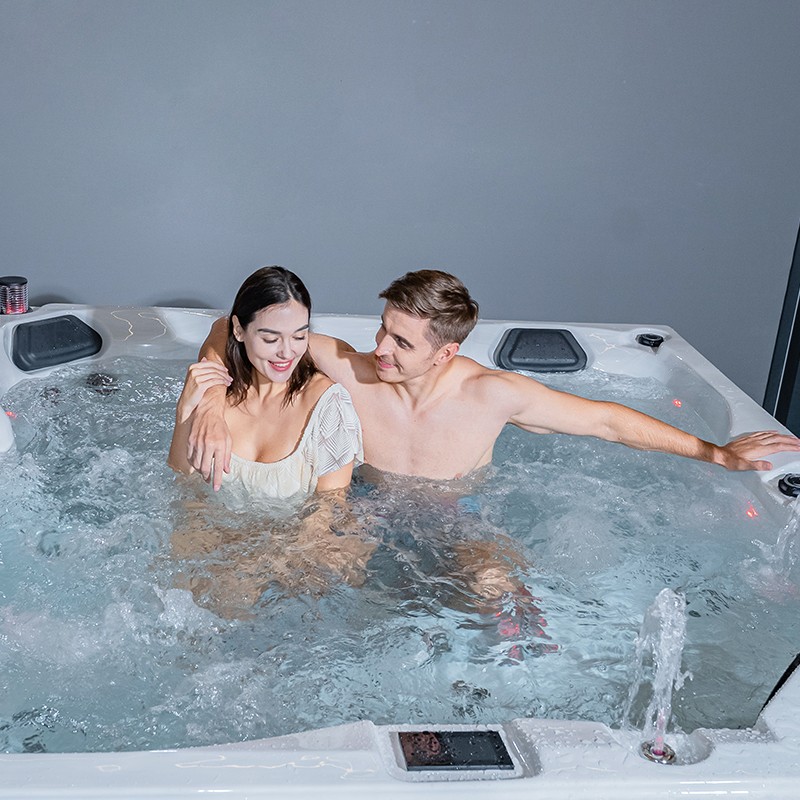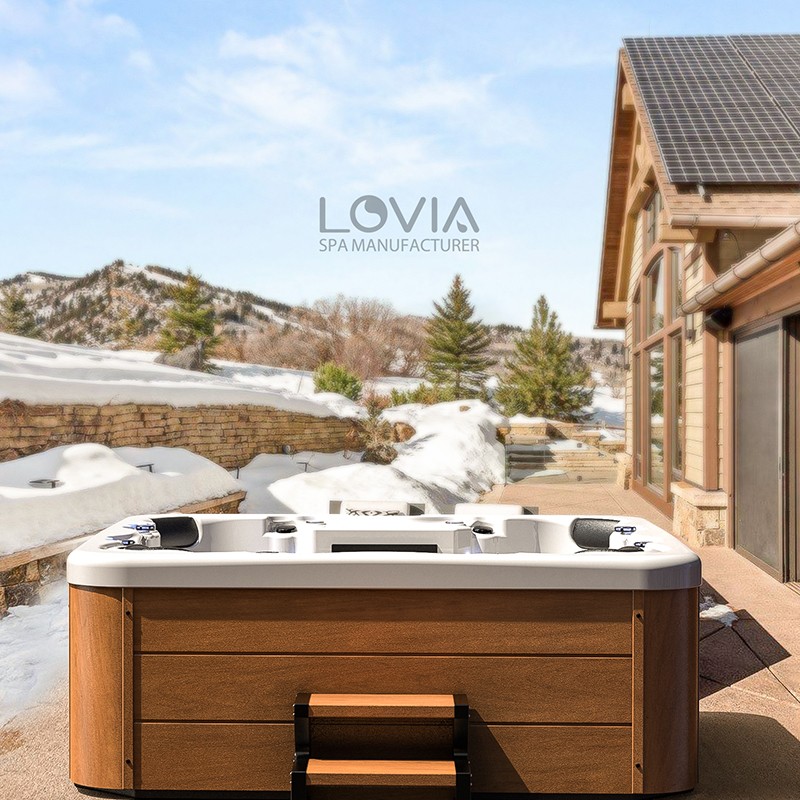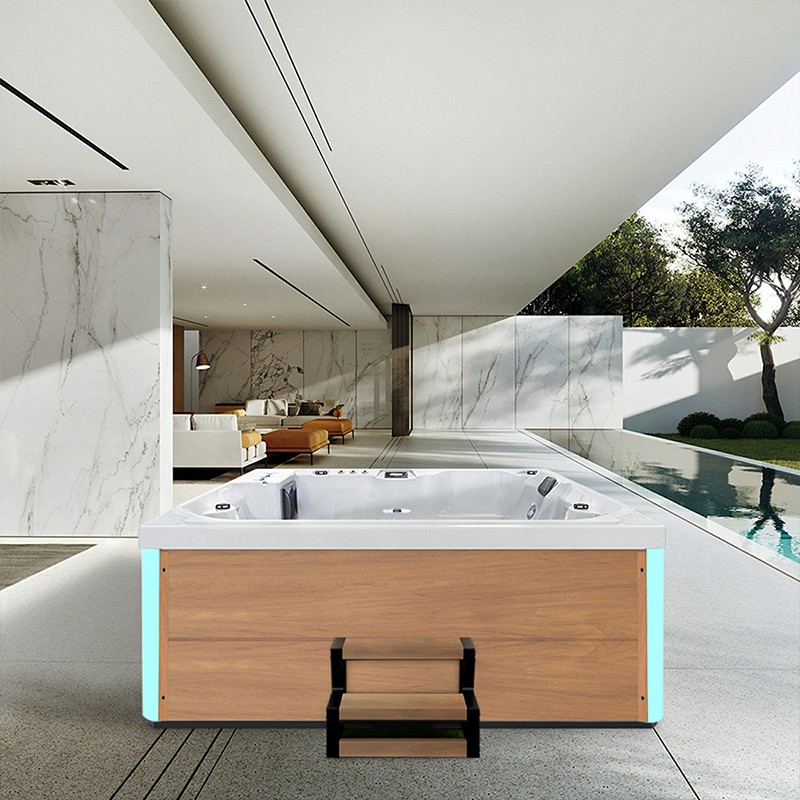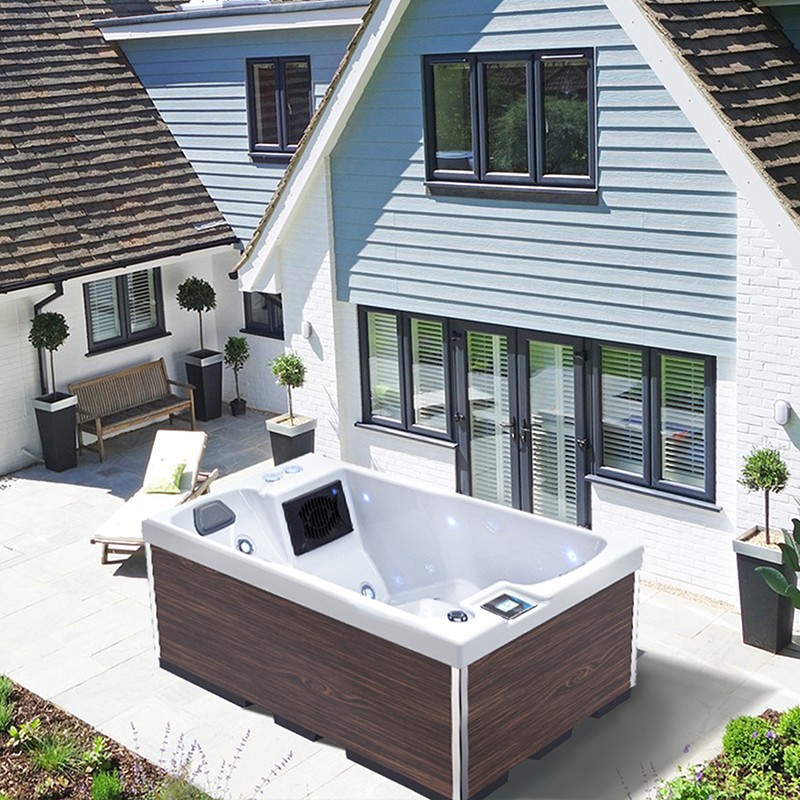
What effect does outdoor spa jacuzzi with different water temperatures have on the skin?
2025-05-12 15:35Nowadays, more and more people choose to relax through outdoor spa jacuzzi. With its unique hydrotherapy effect, outdoor spa jacuzzi has become an important tool for people to relax and relieve stress in daily life. During use, the regulation of water temperature is undoubtedly one of the key factors affecting the overall effect. Outdoor spa jacuzzi with different water temperatures not only has different effects on physical relaxation, but may also have a significant effect on skin health.
This article will explore in depth the effects of outdoor spa jacuzzi with different water temperatures on the skin, and analyze the different effects of low, medium and high temperature water baths on the skin in combination with physiological principles. From a scientific perspective, it helps consumers understand how to choose the right water temperature according to their needs to obtain the best skin care effect.

What is the principle of outdoor spa jacuzzi?
Before understanding the effects of different water temperatures on the skin, we first need to understand the basic principles of outdoor spa jacuzzi. Outdoor spa jacuzzi mainly uses systems such as warm water, bubbles, water flow and massage nozzles to help users relieve body tension and fatigue, achieve the effect of relaxation, soothing muscles and promoting blood circulation.
● Hydrotherapy massage system: outdoor spa jacuzzi uses water flow or bubble massage system, high-pressure water flow, bubble massage and other methods to provide deep massage effect for the body. These nozzles are usually distributed in different positions of the bathtub, and can perform full-body or local hydrotherapy massage for different parts of the body.
● Water temperature control system: outdoor spa jacuzzi is usually equipped with a heating system to control the range of water temperature. Different water temperatures have different effects on the physiological reactions of the human body, especially the reactions of the skin. The regulation of water temperature not only affects the comfort level, but may also have different effects on the blood circulation of the skin, the contraction and expansion of pores, and the barrier function of the skin.
Effects of low-temperature hydrotherapy of outdoor spa jacuzzi on the skin
Outdoor spa jacuzzi low-temperature hydrotherapy generally refers to a hydrotherapy environment with a water temperature below 25℃, which is usually used in cold weather or for rapid cooling. Cryotherapy is usually performed in the form of cold water baths, ice water immersion, etc. This type of hydrotherapy has a long history in the health field. Although most outdoor spa jacuzzis usually provide water temperatures between 25℃ and 42℃, some equipment also has a special cold water mode to simulate the effect of cryotherapy.
1. Shrink pores
The cold water of outdoor spa jacuzzi can cause blood vessels on the surface of the skin to contract, and this reaction has a two-way effect on the skin. On the one hand, the contraction of pores will reduce the possibility of external dirt, dust, and bacteria entering the skin. On the other hand, it will also slow down the aging process of the skin. For oily skin or acne-prone skin, cold water helps to reduce sebum secretion and achieve the effect of oil control.
2. Relieve inflammation and redness
Another important role of cold water on the skin is to relieve inflammation. Low temperature can slow down local blood circulation, reduce inflammation and swelling, and help relieve allergic reactions or redness of the skin. For some skin diseases, such as eczema and urticaria, cold water therapy is believed to effectively relieve symptoms.
3. Enhance skin elasticity
Another potential benefit of cold water is to enhance the firmness of the skin. When cold water comes into contact with the skin, the surface muscles and skin will feel a momentary tightening, which helps to improve the firmness and elasticity of the skin. This effect is very beneficial for users who want to improve skin sagging and reduce fine lines.
4. Promote metabolism
Cold water stimulation can promote metabolism on the surface of the skin and accelerate blood circulation. In this way, the skin can excrete metabolic waste more quickly and increase the absorption of nutrients. The effect of cold water on metabolism is temporary, but it has a certain positive effect on the overall health of the skin.

The effect of medium-temperature hydrotherapy on the skin
Moderate-temperature outdoor spa jacuzzi usually sets the water temperature between about 30℃ and 38℃. Hydrotherapy in this temperature range is closer to the natural temperature of the human body and is therefore suitable for most people. Medium-temperature hydrotherapy is not as stimulating as hot hydrotherapy, but it can provide a gentler and more relaxing experience.
1. Improve blood circulation
When soaking in a moderately hot outdoor spa jacuzzi, the body's blood vessels begin to dilate and blood flows more smoothly. Improved blood circulation can help the skin get a better supply of nutrients and promote the repair and renewal of skin cells. This helps to improve the skin's radiance and make the skin look healthier.
2. Soothe muscles and relieve fatigue
Medium-temperature hydrotherapy can effectively soothe the muscle groups under the skin and relieve muscle soreness after long hours of work or exercise. This gentle relaxation not only reduces stress on the body, but also has a positive effect on the skin. By relieving muscle tension, medium-temperature hydrotherapy helps the blood flow and metabolism of the skin.
3. Promote skin hydration
Warm water has a natural moisturizing effect and can help the skin replenish moisture. Especially in dry climates, warm water can open the skin's pores, allowing the skin to better absorb moisture and moisturizing factors from the surrounding environment. This hydration is particularly important for keeping the skin soft and smooth, especially in cold seasons when the skin is prone to cracking or dehydration.
4. Enhance the skin barrier function
Warm water helps the skin maintain its natural barrier function by activating the skin's blood circulation and the secretion of sebaceous glands. After soaking in warm water, the skin's natural oils will form a protective layer on the surface to prevent excessive evaporation of water. This self-repair process helps to enhance the skin's defenses against damage from the external environment.

The impact of high-temperature hydrotherapy on the skin
High-temperature hydrotherapy usually refers to a hydrotherapy environment with a water temperature above 39°C. Some outdoor spa jacuzzis can even set the water temperature above 42°C. High-temperature hydrotherapy can provide a strong relaxation effect, but its effect on the skin is more complicated, and too high a water temperature may bring some potential negative effects.
1. Dilation of pores and detoxification
High-temperature hydrotherapy can accelerate the expansion of pores, thereby promoting deep cleansing of the skin. The expansion of pores helps to remove impurities, oils and dead skin cells from the skin, which is particularly effective for oily skin and acne skin. Through sweating and detoxification, high-temperature water can help the skin clean up accumulated waste and achieve a deep cleansing effect.
2. Improve skin metabolism
High-temperature hydrotherapy can accelerate skin metabolism, promote blood circulation, and make the skin recover and repair faster. High-temperature water baths can bring short-term comfort and relaxation, especially for people who are exposed to stress and tension for a long time, which can effectively relieve physical and mental fatigue.
3. Overstimulation and dry skin
Although high-temperature hydrotherapy can bring a sense of relaxation, it can also have some negative effects on the skin. Long-term immersion in a high-temperature outdoor spa jacuzzi may cause excessive water loss from the skin, causing the skin to become dry and rough. For people whose skin itself lacks hydration, excessive hot water stimulation may also damage the skin barrier function, leading to allergic or irritating reactions.
4. May cause vasodilation problems
High-temperature hydrotherapy has a strong stimulation on blood vessels. Overheated water temperature may cause small blood vessels on the surface of the skin to dilate, and may even cause the formation of red blood vessels. Especially for people whose skin is more sensitive and easily irritated, overheated water temperature may cause adverse reactions, causing skin discomfort and adverse consequences.

How to choose the right water temperature according to skin conditions?
For different skin types and needs, consumers can choose the appropriate spa program according to the water temperature of the outdoor spa jacuzzi. The following are suggestions for choosing water temperature for different skin conditions:
● Oily skin: Oily skin is prone to acne and has large pores. It is recommended to choose low or medium temperature spa. Low temperature
water can shrink pores and has a more significant oil control effect; medium temperature helps improve skin metabolism.
● Dry skin: Dry skin needs to maintain moisture and avoid excessive stimulation. It is recommended to choose medium temperature spa. Warm water helps moisturize, promote skin hydration, and enhance the skin's barrier function.
● Sensitive skin: Sensitive skin should avoid high temperature spa to avoid excessive stimulation to the skin. Low or medium temperature spa is more suitable for sensitive skin, which can relieve inflammation and soothe the skin.
● Aging or sagging skin: For skin with signs of aging, moderately high temperature spa can be selected. High temperature spa can promote blood circulation and metabolism, and help enhance the firmness and elasticity of the skin.
